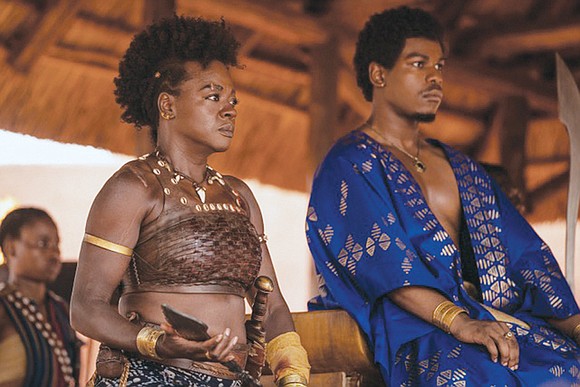‘The Woman King’ is a crowning achievement
Dwight Brown/NNPA News Wire Film Critic | 9/22/2022, 6 p.m.

The mighty women of the Agojie were warriors. From the 1600s to1800s in the West African Kingdom of Dahomey this all-female military regiment gallantly fought their empire’s enemies.
Film fans first glimpsed the Dahomey Amazon legacy in the Marvel movie “Black Panther,” where the Dora Milaje special forces in the fictional nation of Wakanda were modeled after those fighters. So, an introduction has already been made.
On a visit to Benin in 2015, actress/producer Maria Bello encountered the legend of the Agojie, fathomed a movie and with screenwriter Dana Stevens, crafted a fictionalized story of true-life female combatants. Other corroborators include filmmaker Gina Prince-Bythewood, who researched the women, culture and era; Oscar®-winning actress Viola Davis and her production company; and producer Cathy Schulman (Crash).
In 1823, in a region that is now Benin, General Nanisca (Ms. Davis) leads a military regiment that serves at the pleasure of young King Ghezo (John Boyega). Her women and girls help protect the embattled kingdom of Dahomey from neighboring adversaries like the Oyo Empire, led by the murderous Oba Ade (Jimmy Odukoya) and from white Brazilian enslavers, commanded by Santo Ferreira (Hero Fiennes Tiffin). Their mission also includes freeing and releasing captured Africans headed for slave ships.
The wise Nanisca is aided by her top officers, the courageous Izogie (Lashana Lynch, “No Time to Die”) and a very nurturing Amenza (Sheila Atim, “The Underground Railroad”). Girls and women vie to enlist in their army. Nawi (Thuso Mbedu, “The Underground Railroad”), an abused and orphaned adolescent, is among the candidates competing for a position in a troop that’s comprised of virgin women who eschew marriage and men. Nanisca eyes the rebellious aspirant, who doesn’t always follow orders but shows no fear and exhibits leadership qualities. The two spar physically and verbally. Nawi: “They say that the soldiers are magic. But you look like an old woman to me.” Conflict and warfare rages around them.
The script sets the premise, time and location. The soldiers, kings and enslavers are large on the page, and even grander on a movie screen. The rivalries, betrayals, palace intrigue, romances, mentoring, grudges, ferocious battles and subplots are as epic and mythical as those in “The Gladiator” or “Star Wars” sagas. The topical theme of fighting oppression is evident in the war against enslavers. The righteous movement to protect others from human trafficking and subjugation is galvanizing. Black history buffs may know that some African tribes were complicit in the slave trading industry. Others maybe not. This can be a learning experience. Nanisca to the King: “Let us not be an empire that sells our people!”
The King’s dwelling, the village and port towns (shot in Cape Town, South Africa) look regional and historic due to Akin McKenzie’s production design. Costume designer Gersha Phillips enhances the pageantry with lavish robes that drape the king and his wives and adds to the Agojie’s fiery personae with uniforms that highlight their lean physiques.
Writing and directing romantic dramas and segueing into badass superhero films primed Prince-Bythewood for this feminist fable. Like an artist and a shaman, she creates an atmosphere steeped in culture and history. Along with the extraordinary stunt choreography, she makes the fight scenes chaotic, balletic and glorious. Under her guidance the palace drama seems royal and dire and the romance between Nawi and the Brazilian Malik (Jordan Bolger) is enchanting. Her creativity and versatility are on view throughout.
Viola Davis is magnetic, intense and powerful as the commanding general. She heads an ensemble that milks their characters’ emotions and adds human portraits to the story of slavery, especially for those who fought against it.
A deft team of female artists have masterfully created a feminist allegory that will excite and inform movie lovers for years to come.
“The Woman King” premiered at the 2022 Toronto International Film Festival and won a standing ovation. Among a stellar group of diverse films and voices, it still rose to the top.





